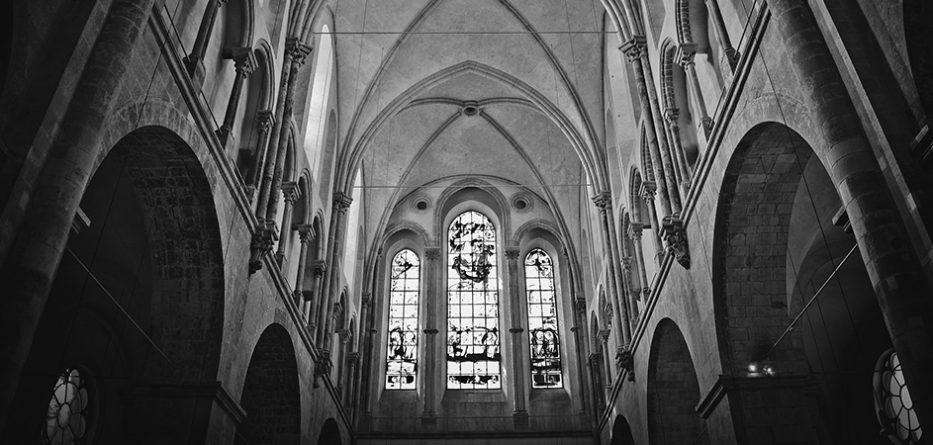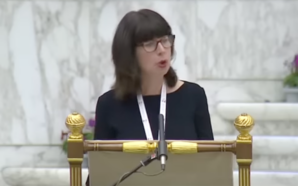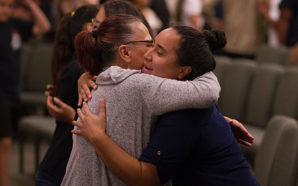This article originally appeared in the April edition of Melbourne Catholic Magazine.
I have an enduring memory of my dad: it’s a Saturday evening, the TV is on in the background and he is sitting in his armchair with the Sunday missal on the table beside him, pen in hand, notepad on his lap. He is focussed on the readings for the next day and he is making his notes. He was preparing his Commentator script which would, the next morning, introduce the 11am Sunday Mass.
Dad was an engineer by trade, one of two sons from a staunchly Irish Catholic family. He was a quiet man and lived, compared to how we live now, a small life. A life of routine centred around his family, his work and his parish—and football during the football season. Most weekends were peppered with sport pick-ups and dropoffs—the usual stuff of family life. Sunday afternoons were always about his parents; dad would drive us to a neighbouring suburb to visit and he would do whatever jobs needed to be done for them—mowing the lawn or gardening usually. There would be afternoon tea and, on the way home, a stop at the train station so that he could buy his weekly train ticket (to save time in the morning). Then the week would start again.
Dad was diagnosed with cancer at the relatively young age of 55 and died when he was 64. He lived with his cancer with the same stoicism with which he lived his life. He did not complain—he just went on. I wonder, looking back, if this was partly because of his constancy in reading the Scriptures. He internalised the story of Jesus and he lived a humble life with his God. In the midst of pain, suffering, the chemo and the radiotherapy, he maintained a steady hope and would just say, ‘What will be, will be’.
Dad rarely spoke about his feelings but, as he was preparing for death, he sometimes talked about how he was and what it felt like to be dying. Sometimes when I went home to visit, I would walk in and Mum would say that Dad had been waiting for me, so I would go up and sit on the side of his bed and we would chat. It took a little while for me to get into the rhythm of our conversations because there were many silences: there are times when sitting in silence is the best way to communicate with another.
As he prepared for his death, he always had his missal at his side. He would thumb the pages and read the texts that had accompanied him throughout his adult life. Sometimes he would ask me to read a psalm with him and I came to realise the universality of the psalms. In these songs, the hopes and dreams, laments and worries of the ancient people rise up, a reminder to us that we are not alone—that others have lived, loved and lost and that God remained steadfast through it all. Sometimes we would listen to music and as his earthly days grew shorter, Andrew Lloyd Webber’s ‘Pie Jesu’ seemed to speak to his heart and soul. A Latin scholar, he didn’t need the English translation:
Merciful Jesus, merciful Jesus, merciful Jesus, merciful Jesus
Father, who takes away the sins of the world
Grant them rest, grant them rest
Merciful Jesus, merciful Jesus, merciful Jesus, merciful Jesus
Father, who takes away the sins of the world
Grant them rest, grant them rest
Lamb of God, Lamb of God, Lamb of God, Lamb of God
Father, who takes away the sins of the world
Grant them rest, grant them rest
everlasting, everlasting rest.
By the liturgical year, Dad died (many years ago now) on the second Sunday of Easter. Each year on this Sunday we read from John’s Gospel (20:19–31). It is the story of Jesus appearing to the disciples in the closed room, where they had gathered in fear. It is hard to imagine how they must have felt—the public death of the man they loved had been brutal. The one to whom they had looked for guidance and in whom they had believed had left them and they were at risk in the community. It is no wonder that they feel joy at the appearance of Jesus! Jesus greets the disciples with peace and breathes the Holy Spirit into their sorrowing hearts and minds. The second part of the story is the story of Thomas and his unbelief.
So, I always remember my dad on the second Sunday of Easter. A man who embodied the theological virtues of faith, hope and love by the constancy with which he lived his daily life. Because most of us live small lives really. But believers live in hope because we know that the same God who inspires our first breath also inspires our last. And we know, because of the testament of the lives of generations of witnesses who have gone before us, that light always overcomes the dark, that goodness always triumphs over evil and that Jesus, who once was dead, lives.
And this, I think, is what my dad knew all along and is why he wasn’t really afraid of death. Because Jesus was real to him and he lived and died with the hope that wherever he went, his Jesus went with him.
This didn’t make his suffering any easier, though. Suffering is hard and there are times when we feel as though we can’t go on. These are the times when we feel as though we are empty and we have nothing left to offer. Times when it’s just hard to get out of bed and when we hear every laugh from another as an assault on our tender condition. When we look in amazement at the way life can just go on for others. When we feel as though our bones are almost ready to snap because of sadness, tiredness and loss. When we feel as though the Church itself has let us down and that our confidence is lost. When we stare into the darkness in the middle of the night and our Good Friday hearts cry, ‘My God, my God, why have you abandoned me?’
Because Christians, as Catherine Mary Hilkert notes in Naming Grace, ‘do not have an explanation of either suffering or hope, but only the story of Jesus and a cloud of witnesses who throughout history have testified to their experiences of resurrection’. So, let’s lean into the Resurrection story—the ultimate story of hope. Because perhaps the witness of those very first followers in that upper room, embodied now in our most recently baptised Christians and all the generations in between, is enough for even the most restless heart to proclaim with confidence: Alleluia, Christ is risen!
Cathy Jenkins is the Director of the Archbishop’s Office for Evangelisation.
With thanks to Melbourne Catholic Magazine and the Archdiocese of Melbourne, where this article originally appeared.








